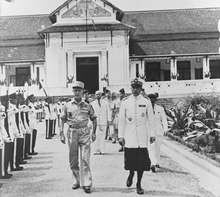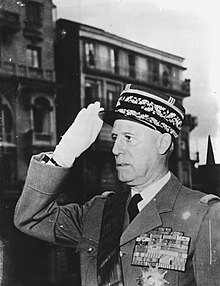|
Raoul Salan
Raoul Albin Louis Salan (French pronunciation: [ʁaul salɑ̃]; 10 June 1899 – 3 July 1984) was a French Army general and the founder of the Organisation armée secrète, a clandestine terrorist organisation that sought to maintain French Algeria by preventing Algerian independence. He served as the fourth French commanding general during the First Indochina War. He was one of four retired generals who organized the 1961 Algiers putsch operation.[1] He was the most decorated soldier in the French Army at the end of his military career.[2] World War I Salan was born on 10 June 1899 in Roquecourbe, Tarn.[1] Enlisted in the French Army for the duration of the war on 2 August 1917, he was accepted in the École spéciale militaire de Saint-Cyr[1] on 21 August 1917, being assigned to the cadet student platoon of the 16th Infantry Regiment stationed at Montbrison, as part of the promotion "de Saint-Odile et de La Fayette" (1917-1918).[3][4] Salan graduated as an aspirant on 25 July 1918, and was assigned to the 5th Colonial Infantry Regiment (5e RIC) in Lyon on 14 August 1918. As a platoon leader in the 5e RIC's 11e Compagnie, he took part in the fighting in the Verdun region (Saint-Mihiel, Les Éparges, Fort de Bois-Bourru, Côte de Oie, Cumières-le-Mort-Homme). He was mentioned in the Order of the Brigade by Order dated 29 December 1918. World War IIUntil France's surrender in World War II, Colonel Salan commanded a battalion of Senegalese troops. He initially sided with the Vichy Government, but defected to the Allies in December 1942.[5] Between the World Wars he was attached in various capacities to the Ministry of Colonies, and in 1941–43 he served with the Free French forces in French West Africa. After participating in the Allied invasion of France in 1944, he went to Indochina in 1945 and was commander in chief there during 1952–53.[6] Indochina and AlgeriaSalan served as the commander of French forces in Vietnam from 1945 to 1947.[7] By 1948, he was commander of all French land forces in East Asia, and after the death of Jean de Lattre de Tassigny in 1952, Salan became the commander-in-chief in Indochina.[7]  Salan served as commander-in-chief of French forces in French Algeria in 1956.[7] In 1958, he established special military internment centers for PAM rebels. The Minister of Interior declared a state of emergency, while the army engaged in a "struggle against the terrorism" of the FLN. Special powers were devolved to the military and were returned to civilian powers only in September 1959, when Charles de Gaulle made his speech on self-determination. General Salan refused to apply the Geneva Conventions ratified by France in 1951 because the detainees were not POWs. The civil authorities had different attitudes concerning the use of torture by the military. In 1958, Salan called for the return to power of Charles De Gaulle, believing that the latter would protect French Algeria.[7] He retired shortly after, first moving to Spain, then to mainland France.[7] He was banned from entering Algeria in 1960.[7] Nevertheless, Salan returned to Algeria to organize the putsch on 21 April 1961 with André Zeller, Edmond Jouhaud and Maurice Challe.[7] After the failure of the putsch, he became the chief of Organisation armée secrète (OAS), which attempted to disrupt the April 1962 Peace Evian Accords.[7] Salan, who was sentenced to death in absentia, was arrested in April 1962.[7] He was tried for treason and sentenced to life in prison.[8][9][10] Salan was pardoned and released from prison in June 1968.[1][11] He was amnestied by the French parliament and re-instated to the rank of general in 1982. Death Salan died on 3 July 1984. Every year, former members of the OAS bring flowers to his tomb on his death anniversary.[12] DecorationsSalan was the most decorated soldier in the French Army.[7][13]  French and Colonial Decorations
Foreign Decorations
Bibliography
References
Further reading
External links
Wikimedia Commons has media related to Raoul Salan. |
||||||||||||||||||||||||||
